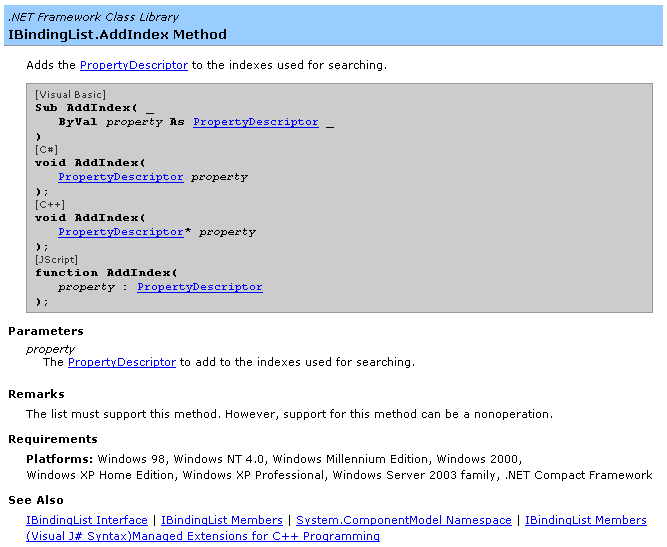Have you ever noticed that much of the online MSDN .NET framework help is.. not helpful? Take the the MSDN help for the IBindingList.AddIndex method, for example:

Scott Swigart calls this undocumentation, and elaborates further in his blog post:
This is an example where quacking like a duck doesn't make you a duck. This looks like documentation. It shows up in the help alongside documentation, it's indexed like documentation, but it's not documentation. It doesn't actually tell anyone anything they didn't already know.Large swaths of the Framework are undocumented in exactly this way, and many v1.0 SDKs are, well, very undocumented.
Honestly, my problem isn't that lots of stuff is undocumented. It's that Microsoft spent time writing this undocumentation, proof-reading this undocumentation, and putting this undocumentation through the same process as the real documentation. I don't know how much time was spent undocumenting things, but I'm guessing that if you add it all up, it's a lot.
I guess on the documentation teams, there must be some law that no class, property, method, or event will show up in the help with a big, bold, "Undocumented".
Can we stop pretending? Can you just mark everything as Undocumented until you get around to writing real documentation for it? Maybe even include a "Click here to vote to have this documented." For a simple test, if it doesn't include a code example, it's not documented. Just mark it as such and move on.
What really scares me is that tools like GhostDoc produce exactly this kind of useless undocumentation. Now, I understand that GhostDoc is just a tool intended to assist developers in producing real documentation. And like all tools, it can be used properly or abused. But whatever you do, please don't knowingly produce undocumentation for your applications. Have some respect for your users and your fellow developers. Either take the time to write helpful documentation, or have the guts to acknowledge that there simply is no documentation.
I encounter undocumentation all the time when I'm rooting around for help on the .NET framework. For example, take a look at the MSDN help for the PassportIdentity.SignOut method*. This particular example of undocumentation is even more egregious, because it actually includes code samples! Utterly useless, one-line code samples. In each language.
' This example demonstrates how to sign a user out of Passport. ' local GIF file that the user is redirected to. Dim signOutGifFile As String = "signout.gif" ' Signs the user out of their Passport Profile and displays the SignOut.gif file. System.Web.Security.PassportIdentity.SignOut(signOutGifFile)
// This example demonstrates how to sign a user out of Passport. // local GIF file that the user is redirected to. string signOutGifFile = "signout.gif"; // Signs the user out of their Passport Profile and displays the SignOut.gif file. System.Web.Security.PassportIdentity.SignOut(signOutGifFile);
But hey, at least the code samples are valid. As a Vertigo developer pointed out a few months ago, the code samples on the MSDN help page for IComparable.CompareTo aren't even correct:
public class Temperature : IComparable
{
public int CompareTo(object obj) {
if(obj is Temperature)
{
Temperature temp = (Temperature) obj;
return m_value.CompareTo(temp.m_value);
}
throw new ArgumentException(
"object is not a Temperature");
}
protected int m_value;
public int Value
{
get { return m_value; }
set { m_value = value; }
}
public int Celsius
{
get { return (m_value-32) / 2; }
set { m_value = value * 2 + 32; }
}
There are any number of websites documenting how to convert Fahrenheit to Celsius and vice-versa:
- Take the temperature in Fahrenheit and subtract 32.
- Divide by 1.8.
- The result is degrees Celsius.
Oddly enough, the C++ sample on the same page is correct. I guess C++ developers really are smarter.
Grousing about all this undocumentation is funny, but it doesn't magically produce useful documentation. Here's something that might, though: why not make the .NET framework documentation a Wiki?
* Yes, we work on a few apps that use Microsoft Passport. God help us. God help us all.